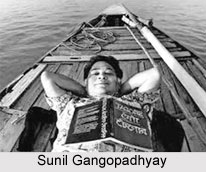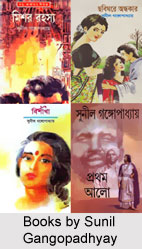 Sunil Gangopadhyay, born on 7 September 1934, was a celebrated poet and novelist. His contribution in every genre of modern Bengali literature remains unparalleled. A prolific and versatile writer, Sunil Gangopadhyay has authored several path breaking collections of poetry, novels, short stories, plays essays, many of which have been made into films. Founder of the seminal poetry journal Krittibas and the winner of several literary awards, namely the Ananda Puraskar, Bankim Puraskar and the Sahitya Akademi Award, Sunil Gangopadhyay also served as the Vice president of the Sahitya Akademi. Sunil has written in many other genres including travelogues, children fiction, short stories, features and essays. Among his pen names are: Nil Lohit, Sanatan Pathak and Nil Upadhyay.
Sunil Gangopadhyay, born on 7 September 1934, was a celebrated poet and novelist. His contribution in every genre of modern Bengali literature remains unparalleled. A prolific and versatile writer, Sunil Gangopadhyay has authored several path breaking collections of poetry, novels, short stories, plays essays, many of which have been made into films. Founder of the seminal poetry journal Krittibas and the winner of several literary awards, namely the Ananda Puraskar, Bankim Puraskar and the Sahitya Akademi Award, Sunil Gangopadhyay also served as the Vice president of the Sahitya Akademi. Sunil has written in many other genres including travelogues, children fiction, short stories, features and essays. Among his pen names are: Nil Lohit, Sanatan Pathak and Nil Upadhyay.
Early Life of Sunil Gangopadhyay
Sunil was born in Faridpur (now a part of Bangladesh). He completed his degree in Bachelor of Arts while studying at the Surendranath College, Dum Dum Motijheel College, and City College - all in the city of Kolkata and affiliated with the University of Calcutta. Thereafter, he obtained his degree in Master of Arts in Bengali from the University of Calcutta in 1954.
Literary Career of Sunil Gangopadhyay
Sunil Gangopadhyay was the founder editor of the popular seminal magazine named Krittibas, which started publishing from the year 1953. This magazine later went on to become a platform for a whole new generation of poets trying out new forms in poetic themes, rhythms, and words.
He later started to write for numerous publication of the Ananda Bazar group (ABP), a major publishing house in Kolkata and has been continuing it for many years. He became a close associate to poet Allen Ginsberg while he was travelling in India. Ginsberg in his poem September on Jessore Road, mentioned the name of Sunil Gangopadhyay. In return, Sunil too returned the favour by mentioning the name of Ginsberg in some of his prose work. In the year 2008 on 20th February, after serving five years as the Vice President, he was elected the President of the Sahitya Akademi.
Literary Career of Sunil Gangopadhyay
Sunil Gangopadhyay was the founder and editor of the popular seminal magazine named Krittibas, which started publishing from the year 1953. This magazine later went on to become a platform for a whole new generation of poets trying out new forms in poetic themes, rhythms, and words.
 He later started to write for numerous publication of the Ananda Bazar group (ABP), a major publishing house in Kolkata which continued till several years. He became a close associate to poet Allen Ginsberg while he was travelling in India. Ginsberg in his poem September on Jessore Road, mentioned the name of Sunil Gangopadhyay. In return, Sunil too returned the favour by mentioning the name of Ginsberg in some of his prose work. In the year 2008 on 20th February, after serving five years as the Vice President, he was elected the President of the Sahitya Akademi.
He later started to write for numerous publication of the Ananda Bazar group (ABP), a major publishing house in Kolkata which continued till several years. He became a close associate to poet Allen Ginsberg while he was travelling in India. Ginsberg in his poem September on Jessore Road, mentioned the name of Sunil Gangopadhyay. In return, Sunil too returned the favour by mentioning the name of Ginsberg in some of his prose work. In the year 2008 on 20th February, after serving five years as the Vice President, he was elected the President of the Sahitya Akademi.
Sunil, along with Tarun Sanyal, Jyotirmoy Datta and Satrajit Dutta had volunteered to be defence witnesses in the famous trial of Hungry generation movement poet Malay Roy Choudhury. Famed for his liberal, secular and open-minded ever opinionated self, Gangopadhyay always rebelled against religious bigotry, and his pen was sharp in condemning the 1992 communal riots. Author of well over 200 books, Sunil is a prolific writer who has excelled in different genres but declares poetry to be his "first love".
Sunil is the author of more than 200 books. Being a prolific writer, he excelled in various genres. He, by his own admission, prefers poems as describes it as his "first love". His Neera abd Nikhilesh series of poems (some of it have been translated as For You, Neera and Murmur in the Woods) have been tremendously admired and well accepted.
As he swam with fluency amidst the poetic depths, his style in prose was not to be missed. Atmaprakash, his first debutant novel in literature had been published in renowned magazine Desh (1965), and stroked the bricks of critical worldview. It was critically acclaimed and faced some controversy as well because of the obscene and aggressive style that the writer consciously followed.
Another of his popular novel - Sei Somoy (translated into English by Aruna Chakravorty as Those Days) received the Indian Sahitya Akademi Award in 1985. Sei Somoy continues to be a best seller more than two decade after its first publication. The same is true for Prathama Alo (also translated recently by Aruna Chakravorty as First Light), another best selling historical fiction and Purbo-Paschim, a raw depiction of the partition and its aftermath seen through the eyes of three generations of Bengalis in West Bengal, Bangladesh and elsewhere. He is also the winner of the Bankim Puraskar (1982), and the Ananda Puraskar (twice, in 1972 and 1989).
Personal Life of Sunil Gangopadhyay
He married Swati Bandopadhyay on 26 February 1967. Their only son, Souvik, who stays in Boston, was born on 20 November 1967. Sunil Gangopadhay breathed his last on 23 October 2012. A doyen of literature, who termed poetry as his first love, even ransacked all other chambers of creative lingual panorama. Bohemian in his life style, an inhabitant of Kolkata till he died, this veteran author, poet imbibed the similar warmth, life force that the city offers. It was Kolkata, the city of joy that had been a silent spectator to the bespectacled flowering of his inimitable talent shaped by a passion for reading, his endless informal chat sessions a well as his last journey. He was the pole star, whose mind travelled in search of life, much showcased by his poetic his literary sojourn.
List of Major Works
Poetry
| Eka o Koyekjon |
Hathat Nirar Janya |
Bhorbelar Upohar |
| Sada Prishtha tomar sange |
Sei Muhurte Nira |
Kaydata Shikhe Nebe |
|
|
|
Novels
| Atmaprakash (1965) |
Chaya Darshon |
Anno Jiboner Shad |
Shopno Somvob |
|
|
|
|
| Aashray |
Alpona Aar Shikha |
Achena Manush |
Aamar Swapna |
| Gonesh Diye Shuru |
Unmochoner Muhurte |
Adhar Raater Atithi |
Aakash Paatal |
|
|
|
|
| Ekti Rat Tinti Jibon |
Jomoj Kahini |
Madhu Kahini |
Otyagsahan |
|
|
|
|
| Suniler Satdin |
Rani O Obinash |
Kothay Alo |
Jol Jongoler Kabbo |
|
|
|
|
Kakababu Series
| Sabuj Dwiper Raja |
Kakababu O Sindukrahasya |
Kakababu O Bajralama |
Santu Kothay,Kakababu Kothay |
|
|
|
|
| Vijaynagarer Hire |
Jangaler Modhe Ek Hotel |
Bhayankar Sundoor |
Santu O Ak Tukro Chand |
|
|
|
|
| Kakababu Herey Gelen |
Kolkatar Jongole |
Bhopal Rahashya |
Pahar Churae Atanka |
|
|
|
|
| Khali Jahajer Rohosyo |
Agun Pakhir Rohoshyo |
Kakababu Bonam Chorashikari |
"Sadhubabar haat (Short Story)" |
|
|
|
|
| Ulka Rahoshsho |
Kakababu O Ek Chhodmobeshi |
Ebar Kakababur Protishodh |
Mishor Rohoshsho(Mystery in Egypt) |
|
|
|
|
| Kakababu O Ashchorjo Dweep |
Agneyogirir peter madhye |
Kakababu O Jaladashu |
|
|
|
|
|
Translated Books
First Light
Those days
East-West
The Lovers and the other stories
Pratidwandi
Murmur in the Woods
The Youth
Ranu O Bhanu Translated by Sheila Sengupta
Awards and honours Received by Sunil Gangopadhyay
Awards
1972: Ananda Puraskar in general category
1979: "National poet" honour was given by Akashbani Kolkata
1983: Bankim Puraskar for the book Sei Somoy
1984: Sahitya Akademi Award for the book Sei Somoy
1989: Ananda Puraskar for the book Purbo-Paschim
1989: Sahitya Setu puroskar
1999: Annada-Snowcem Puroskar for the story Nil Lohiter Golpo
2003: Annadashankar Puroskar
2004: Saraswati Samman for Prothom Alo
2011: The Hindu Literary Prize, shortlist, The Fakir
2012: Sera Bangali Lifetime Achievement Award by Star Ananda
Honours
2002: Sheriff of Kolkata.
Honorary D.Litt from the
Burdwan University
 Sunil Gangopadhyay, born on 7 September 1934, was a celebrated poet and novelist. His contribution in every genre of modern Bengali literature remains unparalleled. A prolific and versatile writer, Sunil Gangopadhyay has authored several path breaking collections of poetry, novels, short stories, plays essays, many of which have been made into films. Founder of the seminal poetry journal Krittibas and the winner of several literary awards, namely the Ananda Puraskar, Bankim Puraskar and the Sahitya Akademi Award, Sunil Gangopadhyay also served as the Vice president of the Sahitya Akademi. Sunil has written in many other genres including travelogues, children fiction, short stories, features and essays. Among his pen names are: Nil Lohit, Sanatan Pathak and Nil Upadhyay.
Sunil Gangopadhyay, born on 7 September 1934, was a celebrated poet and novelist. His contribution in every genre of modern Bengali literature remains unparalleled. A prolific and versatile writer, Sunil Gangopadhyay has authored several path breaking collections of poetry, novels, short stories, plays essays, many of which have been made into films. Founder of the seminal poetry journal Krittibas and the winner of several literary awards, namely the Ananda Puraskar, Bankim Puraskar and the Sahitya Akademi Award, Sunil Gangopadhyay also served as the Vice president of the Sahitya Akademi. Sunil has written in many other genres including travelogues, children fiction, short stories, features and essays. Among his pen names are: Nil Lohit, Sanatan Pathak and Nil Upadhyay.
 He later started to write for numerous publication of the Ananda Bazar group (ABP), a major publishing house in Kolkata which continued till several years. He became a close associate to poet Allen Ginsberg while he was travelling in India. Ginsberg in his poem September on Jessore Road, mentioned the name of Sunil Gangopadhyay. In return, Sunil too returned the favour by mentioning the name of Ginsberg in some of his prose work. In the year 2008 on 20th February, after serving five years as the Vice President, he was elected the President of the Sahitya Akademi.
He later started to write for numerous publication of the Ananda Bazar group (ABP), a major publishing house in Kolkata which continued till several years. He became a close associate to poet Allen Ginsberg while he was travelling in India. Ginsberg in his poem September on Jessore Road, mentioned the name of Sunil Gangopadhyay. In return, Sunil too returned the favour by mentioning the name of Ginsberg in some of his prose work. In the year 2008 on 20th February, after serving five years as the Vice President, he was elected the President of the Sahitya Akademi.













